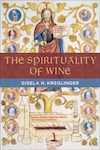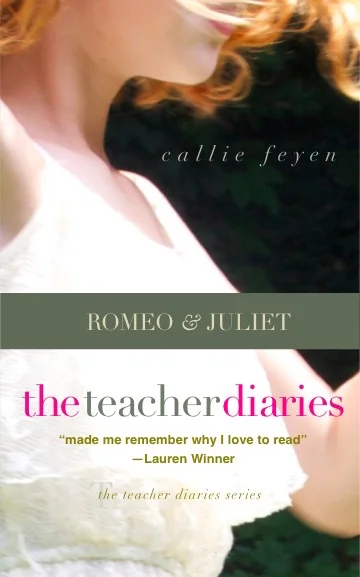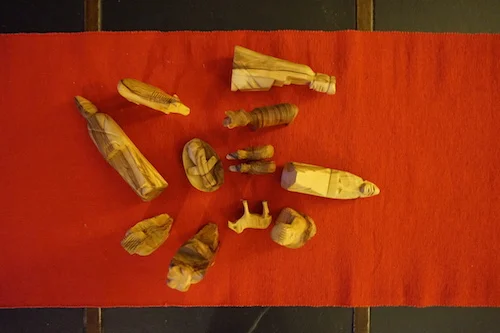Is there an aesthetic to this moral courage of realizing and learning? To me, it is the aesthetic of the windowsill, the threshold, the horizon line, the human face of another. It is framing one’s own perception to experience the expanse beyond it. The expanse, indeed, of the far fields.
All in Bookish
Where's My Daughter? Call Her Forth
I offer my stories—my vulnerable, awkward, growing-up stories—because I’m leveling the playing the field. I want to bear some of what it is my students are going through so they will trust themselves to get at their stories. I’m attempting to pull something out of them, as the Nurse does for Juliet, as Mrs. Carlson has done for me.
Cooking
I love to roam the food writing section of a bookstore, thumbing through cookbooks and looking for the latest cooking memoir. Though my kitchen shelves are nearly full, I can always squeeze in another book of recipes or something educational and fun to read like Michael Pollan’s Cooked. I feel a kinship with people who work with food and spend untold hours in the kitchen. I’m drawn to their stories like a magnet.
Here I Sit
The act of writing itself carves out space for beauty in my life. This has always been true, but without the pretention of doing something big and important, I can relax into whatever shows up on paper—the mess and joy and struggle and grief and giggles of life. These are not the habits of a serious writer, of course. These are not the daily practices and evaluations needed to send a piece out into the world, just as letting the garden go to the wild won’t work as a long-term strategy. But this is what writing is to me right now, how I remember that writing starts with glimpsing into a world of magic, that it starts with, “Here I sit.”
The Anxious Agitator: Martin Luther
Martin quotes Jesus, who said, “Do not be anxious, saying ‘What shall we eat?’ or ‘What shall we drink?’ or ‘What shall we wear?’ Your heavenly Father knows that you need these things.” As we amble through the grass, I picture Martin as the young man who bolted across this very meadow, caught in the stormy terror of God’s wrath. Here he is, speaking of grace. I know that it’s not easy for him. But he offers that grace to me, all the same.
The Full Spectrum
There is only one element I don’t want here in this jumble of life that is suddenly, surprisingly beautiful to me. Except sometimes I do want it, when the autism augments the good of who my daughter is without adding to her misery, that same misery we all know in one way or another during this life between Edens. What I want is for the autism to diminish, and if it can’t do that in her bodily experience, then at least it can grow smaller within the space it takes up in my imagining and understanding of this wonderful girl. I don’t yet know how to relegate it to its proper place, but I am hopeful. If my favorite house is the messy one now, then I can change and grow, too.
The Dilemma of Desire: Juana Inés de la Cruz
You haven’t heard of Sor Juana Ines de la Cruz? You can blame it on centuries of storytellers, the ones who’ve recounted the intellectual traditions of men and ignored the silent and silenced contributions of women. Your ignorance is no surprise. Even in her own day, Juana’s bold public voice was hushed by bishops and priests. It’s been 350 years since she lived, but it’s not too late to bring Juana back. Her words have been here all along.
A Map of the Heavens in Four Poems
It lies on its side, that large, bell-cupped vessel. With the seraph-scrolled handle meant. For comfort’s grip, meant to hold tea and warmth. It is nearly empty and very cold now, rolling on its curve.
In the other room, I can hear him thrashing. I ignore the sounds, the moaning, finally, the silence. In my chair, I read a magazine, anything to delay. The vault into that high bed with the pillow top.
A Shimmer of Possibility
I remember which bookcase it was on, where it was on the shelf, what the light was like. Maybe I opened it to a sentence that might as well have been in neon, a passage I admired for its construction and loved for its truth. I've kept the book all these years and reread it, or at least part of it, a few times (evidenced by the geological strata of marginal notes). And for decades I’ve kept a little sign on my desk with one of her sentences, printed in a font that now seems to scream 1990s: “Work is the backbone of a properly conducted life, serving at once to give it shape and hold it up.”
Hearth and Threshold: Thoughts on a Theology of Home
So what would it look like for us to hold in tension both this graced capacity for making a secure dwelling as well as the possibility of leaving this dwelling? For me, part of this tension can be answered by looking at the architecture of a house.
Garden in the East
The body I am tending is a living and organic revelation of the unseen spirit inside. We are sacraments of the One who made us—beautifully and wonderfully made, as the psalmist would say. I am given charge of this garden from season to season, from birth to death. So, what if I tend to the body the way an attentive gardener would his garden? What then? What is the watering? Where is the history buried here beneath the oak? How do I help to bring about the blooming of springtime flowers even as I embrace the stretch marks and surgery scars in the skin that covers my miraculous muscles?
Lessons in Copycatting
They say good artists copy and great artists steal, so for one, no point worrying about my authorial voice issuing from deep within—I’m an artist, thank you!—and for another thing, why was I born not knowing how to express myself if not so someone could teach me?
Testimonies
Christians love to ask each other how they “got saved.” It’s never been an easy question for me to answer. If you ask, I’ll probably say that I am saved, but also that I am being saved all the time, that it’s a thing I’m working out with more than a little fear and trembling. I’ll say that my “testimony” involves a lot of stories, not just one. My personal history of faith is all bound up in my personal history as a writer and a reader. If you have time to listen, I’ll tell you some of the tales.
Growing Up With Imogene Herdman
Indeed, I knew all about the Herdmans; I lived across the street from a real live set of them, and as we read The Best Christmas Pageant Ever, fear started to fade and intrigue began to grow. This was the first time I rooted for the alleged bad guy.
The Ongoing Search for Gratitude
I need to enumerate the good things in my life. I need to lift my camera to my face in order to see the gratitude. I need to write about it every day and share it with whoever will listen. I need to look around and pay attention. I need to say thank you to my Creator, on good days and bad.
On Honest Art
For a day we considered our deepest disposition, sons of Adam and daughters of Eve that we are: we compartmentalize, we believe one thing to be true and behave as if another thing is true, we say “This matters most!” and then live as if it doesn’t really. This tendency has profound implications, for learning, for labor, for love, for liturgy—for all of who we are, for all of how we live.
How do we begin to find our way to coherence? Can we even imagine a way of seeing and hearing that honestly connects what we believe with the way that we live?
 When I tell people that I am a food writer, they always ask me what I like to cook. I want to ask them if they would ask a film critic to tell them about the movie they are shooting at the moment, but instead I just smile and say, “Scrambled eggs.” That is only part of the truth, but I don’t usually tell them that I started writing about food before I started cooking, creating standards that I could never meet. I do not tell them that fear of failure often means that I eat pre-made guacamole or cheese and crackers for dinner. I worry that this will take away my credibility, even though I know that not everyone who writes about food claims to be good at preparing it.
When I tell people that I am a food writer, they always ask me what I like to cook. I want to ask them if they would ask a film critic to tell them about the movie they are shooting at the moment, but instead I just smile and say, “Scrambled eggs.” That is only part of the truth, but I don’t usually tell them that I started writing about food before I started cooking, creating standards that I could never meet. I do not tell them that fear of failure often means that I eat pre-made guacamole or cheese and crackers for dinner. I worry that this will take away my credibility, even though I know that not everyone who writes about food claims to be good at preparing it.
 Hospitality is serving people and helping people who are in our home. We listen. If they stay in our home, I fix meals and prepare a bed and so forth for them. I read something about—I think it is Benedict's Rule of Hospitality—that there's a difference between serving and being a servant. When I'm serving, I'm in charge. If I'm a servant, you're part of it. If you want to do something to help me, I'll let you do it because that's allowing you in. You're not being in charge. I'm not being in charge.
Hospitality is serving people and helping people who are in our home. We listen. If they stay in our home, I fix meals and prepare a bed and so forth for them. I read something about—I think it is Benedict's Rule of Hospitality—that there's a difference between serving and being a servant. When I'm serving, I'm in charge. If I'm a servant, you're part of it. If you want to do something to help me, I'll let you do it because that's allowing you in. You're not being in charge. I'm not being in charge.
 Could it be that God wanted to redeem not only my life but also all the hustle and bustle that life on the winery brings? We work so hard to make a living from growing vines and crafting wine. Could it be that God cared about it and perhaps was even involved in it? This idea is not quite what I had learned in my confirmation classes over the last two years. But was it not true? Had Jesus not made wine as well?
Could it be that God wanted to redeem not only my life but also all the hustle and bustle that life on the winery brings? We work so hard to make a living from growing vines and crafting wine. Could it be that God cared about it and perhaps was even involved in it? This idea is not quite what I had learned in my confirmation classes over the last two years. But was it not true? Had Jesus not made wine as well?
 When I imagine a rich and balanced life, I picture a home much like Sagamore Hill, bustling with active bodies and active minds, where faithful character above all drives the life of the family. One of Roosevelt’s most common phrases for his experiences was great fun. When mind, body, and spirit are working and growing together, life can indeed be great fun, whether on icy river waters or in the comfort of home.
When I imagine a rich and balanced life, I picture a home much like Sagamore Hill, bustling with active bodies and active minds, where faithful character above all drives the life of the family. One of Roosevelt’s most common phrases for his experiences was great fun. When mind, body, and spirit are working and growing together, life can indeed be great fun, whether on icy river waters or in the comfort of home.






























